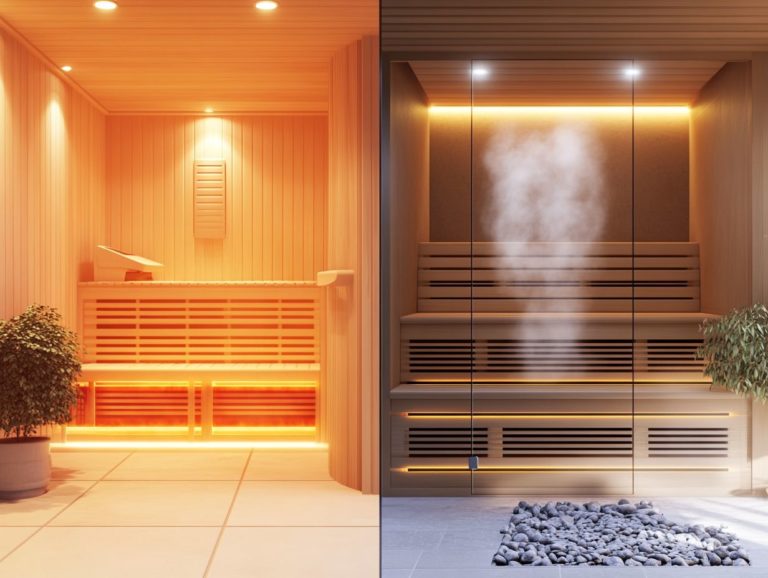Top 7 Benefits of Using a Sauna Regularly
Are you seeking a delightful approach to enhance your overall well-being? Regular sauna use presents a wealth of health benefits, from detoxification and improved cardiovascular health to stress reduction and enhanced immune function.
In this article, you’ll discover the top seven advantages of adding sauna sessions to your wellness plan, learn how saunas work, and explore the different types of saunas along with essential precautions to keep in mind.
Discover how this simple indulgence can boost your health and fitness journey!
Contents
Key Takeaways:

- Regular sauna use helps with detoxification, improving overall health and well-being.
- Using a sauna regularly can improve cardiovascular health, reducing the risk of heart disease and stroke.
- Saunas promote relaxation and reduce stress, leading to better mental and emotional health.
1. Helps with Detoxification
Detoxification is essential for your overall wellness, and incorporating sauna bathing into your routine can enhance this process. When you relax in the high heat of a sauna, your body naturally regulates internal temperature by sweating, effectively flushing out harmful substances like heavy metals, chemicals, and various waste products.
This process boosts your skin’s clarity and supports better cardiovascular health. Research by Dr. Jari Laukkanen shows that regular sauna use is linked to a lower risk of certain diseases, highlighting the significant benefits of heat exposure.
Sweating helps regulate your body temperature, promotes circulation, and enhances your detoxification capacity, offering you a holistic approach to health and well-being.
2. Improves Cardiovascular Health
Stepping into a sauna regularly can greatly benefit your cardiovascular health by enhancing your heart function and helping manage high blood pressure.
During these enjoyable sessions, your body experiences physiological changes like an increased heart rate and better circulation similar to moderate exercise. A study from the University of Eastern Finland reveals that those who make sauna visits a regular part of their lives see a notable reduction in the risk of heart disease. This link between regular sauna use and cardiovascular benefits shows how heat exposure can improve vascular function and support heart health.
Allowing your heart to work a bit harder in a relaxed setting provides immediate stress relief and is a long-term investment in your heart’s health.
3. Reduces Stress and Promotes Relaxation
Sauna sessions offer a sanctuary for stress reduction and muscle relaxation, effectively lowering your stress hormones and enhancing your emotional well-being.
As you settle into the warm, inviting space, you’ll find that these retreats create a tranquil atmosphere that promotes both physical and mental rejuvenation. Traditional wooden saunas envelop you in warm heat, improving circulation, while infrared saunas penetrate deeper, helping your muscles relax and recover.
Research shows that regular sauna use is linked to reduced feelings of anxiety and depression. Many users report a significant mood uplift after a calming session. Numerous stories highlight individuals who find solace in the gentle heat, emerging not just with reduced muscle tension but also with a lasting sense of serenity long after they leave.
Ready to experience these incredible benefits for yourself? Try incorporating sauna sessions into your routine for a healthier, happier you!
4. Boosts Immunity

Regular sauna use boosts your immune function. This is especially beneficial for your respiratory health and overall wellness in colder months.
This enhancement occurs through a delightful interplay of heat exposure and the body’s physiological responses. When you immerse yourself in elevated temperatures, your body initiates a mild stress response, activating various immune cells, including leukocytes and cytokines. These cells are crucial for fighting off infections and inflammation.
Conditions like colds, flu, and even chronic illnesses such as rheumatoid arthritis can significantly improve with stronger immune responses associated with regular sauna visits. Research shows that individuals who embrace heat exposure experience an increase in the production of heat shock proteins, which help your body respond to stress and further boost immunity.
5. Aids in Weight Loss
Engaging in sauna sessions is a valuable addition to your weight loss journey. It promotes calorie burn and detoxification, enhancing your body’s ability to manage temperature.
As your internal temperature rises, it triggers physiological responses that lead to increased calorie expenditure. This mimics the metabolic boost typically associated with physical activity. By incorporating heat therapy into your wellness routine, you complement healthy lifestyle choices like maintaining a balanced diet and committing to regular exercise. This creates a holistic approach to weight management.
Integrating sauna sessions helps support your metabolism and improves your overall well-being. This leads to better performance in physical activities and aids recovery, propelling you toward your long-term fitness goals.
6. Can Help with Skin Conditions
Sauna bathing can transform your skincare routine. It promotes a deep cleanse through sweating and toxin release, leading to healthier skin and overall wellness.
The intense heat and steam create a nurturing environment for your skin. This helps to unclog pores and eliminate impurities. As your body temperature rises, blood circulation improves, delivering essential nutrients to your skin’s surface and giving you that radiant, glowing complexion you desire.
If hydration is on your agenda, the sauna’s humid atmosphere works wonders, allowing your skin to absorb moisture effectively. Don’t miss out try to enjoy sauna sessions two to three times a week for the best results! Regular sessions can significantly improve skin conditions like acne and dryness.
7. Enhances Athletic Performance
Sauna sessions can significantly enhance your athletic performance. They promote muscle relaxation, boost endorphin levels, and aid in recovery after intense physical activity.
Heat therapy effectively reduces muscle soreness, which is essential for anyone looking to recover quickly from strenuous workouts. A study featured in the Journal of Sports Medicine revealed that regular sauna use resulted in a remarkable 20% reduction in delayed onset muscle soreness. This allows you to train more effectively with less downtime.
Professional athletes often share how heat exposure enhances their flexibility, enabling a greater range of motion during performances. By incorporating sauna sessions into your recovery routine, you not only diminish the risk of injury but also optimize your overall performance on the field.
What Is a Sauna and How Does It Work?

A sauna is a beautifully designed heated room tailored for your relaxation and health benefits. It uses heat exposure to help you sweat. There are various types of saunas, each offering a unique experience, including traditional and infrared options.
Traditional saunas typically use wood stoves or electric heaters to warm the air. This creates a high-temperature environment infused with steam that encourages deep sweating. These saunas generally operate at temperatures ranging from 150 F to 195 F. You can choose between dry or wet heat therapy, depending on whether you add water to the heated stones.
In contrast, infrared saunas use heaters that use light to warm you. They provide a milder heat experience, usually between 120 F to 140 F. Infrared wellness boosts circulation and promotes detoxification without the extremes of traditional saunas. This makes infrared options particularly appealing for those seeking therapeutic benefits without the intense atmosphere.
What Are the Different Types of Saunas?
- Traditional Saunas: Typically reach higher temperatures, often soaring up to 200 F, with low humidity that promotes a deep, detoxifying sweat.
- Infrared Saunas: Use specialized panels to emit infrared light, operating at a comfortable range of 120-140 F while maintaining low humidity. This approach penetrates deeper into your skin and offers pain relief and improved circulation.
- Portable Saunas: Resemble cozy little steam rooms that provide moisture-rich environments perfect for relaxation.
Choosing the right type of sauna can significantly enhance specific health outcomes, such as cardiovascular health, muscle recovery, and stress relief. Understanding these distinctions is essential for making an informed choice that aligns with your wellness goals.
What Are the Precautions to Take When Using a Sauna?
When you step into a sauna, it’s essential to take specific precautions, especially if you have health concerns like high blood pressure. This ensures you stay safe while maximizing the benefits of your sauna experience.
Aim to limit your sessions to 15-20 minutes. Don t forget to give yourself adequate cool-down time between visits. Staying hydrated is key; drink plenty of water before and after to maintain your fluid balance and prevent dehydration.
Be attentive to your body. Watch for any signs of discomfort dizziness, nausea, or excessive sweating might signal it’s time to exit the sauna. If you have any pre-existing conditions, consulting with a healthcare professional is a smart move. Their insights can help you tailor an enjoyable and safe sauna experience, ultimately promoting your overall wellness.
How Often Should One Use a Sauna for Optimal Benefits?
For optimal benefits, determine your ideal sauna frequency based on your personal wellness goals and health conditions, typically ranging from 1 to 3 sessions per week.
Several factors influence this frequency, including your fitness levels, specific health issues, and overall comfort. If you’re recovering from cardiovascular issues, be cautious. If you re a fitness enthusiast, more frequent sessions could enhance recovery and relaxation.
Experts like Dr. Jari Laukkanen emphasize the importance of listening to your body. Adjust your sauna frequency based on how you feel after each session. Don t forget to consider your hydration levels and the intensity of the heat, as these elements play a significant role in your overall sauna enjoyment and health benefits.
Don t wait! Start feeling the benefits of sauna use today!
What Are the Possible Side Effects of Using a Sauna?

While using a sauna can be delightful, it s essential to be aware of potential side effects like dehydration and overheating if you don t take the necessary precautions.
You might feel dizzy or experience a rapid heartbeat, especially if you neglect to hydrate beforehand. If you have existing health concerns, particularly cardiovascular conditions, approach sauna use with caution.
To mitigate these risks, aim to keep each session to around 15 to 20 minutes. Make sure to drink plenty of water both before and after your sauna time. Listening to your body is key; if you feel faint or uncomfortable, exit the sauna immediately to avoid serious complications.
What Are Some Tips for Maximizing the Benefits of a Sauna Session?
To truly enjoy the benefits of a sauna session, prioritize hydration, monitor the length of your stay, and consider factors like room temperature and your own comfort levels.
Before entering the sauna, hydrate with water or a sports drink. This sets the stage for optimal benefits. Aim for sessions lasting 15 to 20 minutes; this gives your body time to acclimate without risking overheating. Experts recommend a temperature range of 150 F to 195 F, but adjust according to what feels right for you.
Rehydration is crucial after your sauna experience. Sipping fluids helps replenish the electrolytes you ve lost. By following these guidelines, you can enjoy a revitalizing sauna experience that fosters relaxation and promotes detoxification.
Frequently Asked Questions
What are the top 7 benefits of using a sauna regularly?
1. Improved cardiovascular health: Regular sauna use has been shown to improve blood circulation and lower blood pressure, reducing the risk of cardiovascular diseases.
2. Detoxification: Saunas induce sweat, which helps to rid the body of toxins, promoting overall health and well-being.
3. Stress relief: The heat of the sauna melts away stress, leaving you relaxed and calm.
4. Pain relief: The heat of a sauna can help relieve muscle aches and pains, providing temporary relief for conditions such as arthritis and fibromyalgia.
5. Improved skin health: Sweating from sauna use can help unclog pores and improve skin tone, giving you a healthy glow.
6. Better sleep: The relaxation and stress relief from using a sauna can also lead to better sleep, promoting improved overall health.
7. Boosted immune system: Sauna use increases the production of white blood cells, which can strengthen the immune system and fight off illness.
Ready to experience the benefits of a sauna session for yourself? Dive in and enjoy!






